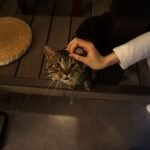Have you ever wondered if your feline companion truly notices when you’re away? You might return from a weekend trip or long day at work to find your cat seeming indifferent or aloof. Though cats often maintain their reputation for independence, the truth is far more heartwarming than you might expect.
Cats can form deep emotional bonds and meaningful connections with their human companions. Research reveals that your seemingly stoic kitty experiences a complex range of emotions during your absence. While they may not greet you with the enthusiasm of a dog, cats have their own subtle yet unmistakable ways of showing they’ve missed your presence.
They’ll Wait by the Door Like a Furry Welcome Committee

If you find your cat strategically placed by the door with an expectant gaze and alert ears, as if anticipating the sound of your keys or your footsteps; most surely, it has missed you and has been anticipating your return. This door-side vigil isn’t just coincidence – it’s one of the clearest indicators that your absence hasn’t gone unnoticed.
If you work regular hours, your cat might anticipate when you get home and start waiting by the door to greet you. Or, they might hear you opening the door and come running to see you. Some cats develop an almost uncanny ability to sense your arrival, positioning themselves as your personal welcoming committee. This behavior becomes even more pronounced after longer absences, revealing just how much they’ve been keeping track of your routine.
Their Vocal Expressions Become More Pronounced

While not renowned for their vocal nature, some cats become more expressive in their meowing when they yearn for their owner. An increased meowing is a sign that they missed you and crave your attention. This heightened vocalization serves as their primary way of communicating their emotional state to you.
When you get home, your cat might meow, chirp and trill. Cats primarily use verbal communication towards people – not other cats (as it’s a learned behavior) – so they’re probably trying to get your attention to let you know they’re happy to see you. The variety in their vocalizations speaks volumes about their emotional intelligence and their desire to reconnect with you after separation.
They Transform Into Your Personal Shadow

However, yours seems to be a little different; it has been shadowing you even since you got back from your holiday. Think no further, your darling feline missed you terribly. This clingy behavior represents their attempt to make up for lost bonding time.
Another common way your cat might show you that they’ve missed you is to become your second shadow, following you from room to room and refusing to leave your side. For many cats, having their owners close by after a period of absence helps them to feel safe and secure again. Not only is it a great compliment and shows how much they love you, but it’s also their way of reconnecting with you.
Physical Affection Reaches New Heights

If your cat comes trotting over to you when you get home and displays behaviors like headbutting you, purring, and chirping or trilling contentedly, this is a sure sign that they’re ecstatic to see you. These physical demonstrations of affection become particularly intense after periods of separation.
Rhythmic paw-kneading is a behavior reminiscent of kittenhood nursing, and it often surfaces when your cat is feeling content and secure. A combination of that with symphonic purring is the sign you have been waiting for: your kitten missed your companionship and is overjoyed that you are back. The combination of kneading and purring creates a symphony of contentment that clearly communicates their joy at your return.
They Seek Out Your Scent for Comfort

Cats love their scent, it is their way of marking territory, and purr-claiming, “You are mine!” Therefore, if you find your cat nestling among your recently worn clothes, that is a clear indicator that they are longing for you. This scent-seeking behavior reveals the depth of their attachment to you.
You might notice your cat sleeping more than usual or choosing to rest in places strongly associated with your scent, such as your bed or favorite chair. Your familiar smell provides comfort and security during your absence, helping them cope with the temporary separation.
Changes in Their Eating Patterns Signal Missing You

Your absence might have disrupted your cat’s eating routine and this can cause a change in their eating habits. Some cats eat less, while others may overindulge due to stress. Nevertheless, both behaviors are reflective of their longing for your consistent presence. These appetite changes serve as clear indicators that your routine plays a crucial role in their daily comfort.
A cat missing their owner might show noticeable changes in eating habits. Some cats may eat less when separated from their owners, while others might overeat as a coping mechanism for stress. Understanding these patterns helps you recognize when your absence has created emotional distress for your feline friend.
Grooming Habits Reveal Their Emotional State

Cats, when experiencing stress or anxiety due to your absence, may resort to excessive grooming as a coping mechanism. This behavior represents their attempt to self-soothe during stressful periods of separation.
Some cats may groom excessively when missing their owners, potentially leading to bald spots or skin irritation. Conversely, others might groom less, indicating depression. These grooming changes provide valuable insights into your cat’s emotional well-being and their need for your presence to maintain their normal routines.
Conclusion

Understanding the subtle ways cats show they miss their owners is a powerful reminder of just how strong those bonds can be. These behaviors prove that despite their reputation for independence, cats form meaningful emotional connections with their human companions. Recognizing these signs not only helps you appreciate your cat’s affection but also strengthens the unique bond you share.
The next time you return home to find your cat exhibiting any of these endearing behaviors, remember that each gesture represents their genuine happiness at your return. What signs has your cat shown you when you’ve been away? Tell us in the comments.






